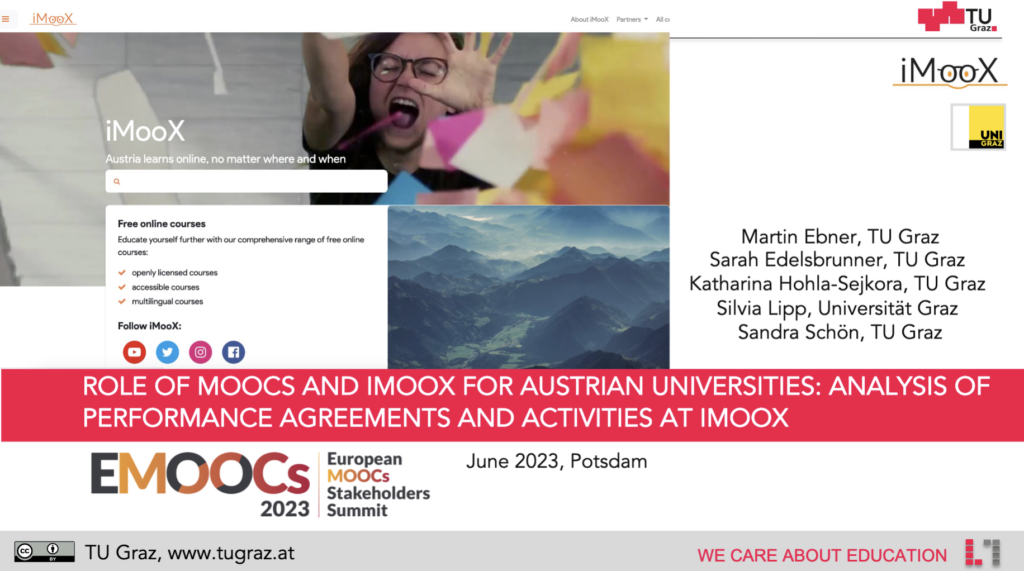We are happy to share our slides of our research titled „ROLE OF MOOCS AND IMOOX FOR AUSTRIAN UNIVERSITIES: ANALYSIS OF PERFORMANCE AGREEMENTS AND ACTIVITIES AT IMOOX“ for this year EMOOCs conference in Potsdam:


Digitale Lehre an und rund um der Technischen Universität Graz
We are happy to share our slides of our research titled „ROLE OF MOOCS AND IMOOX FOR AUSTRIAN UNIVERSITIES: ANALYSIS OF PERFORMANCE AGREEMENTS AND ACTIVITIES AT IMOOX“ for this year EMOOCs conference in Potsdam:

Es freut uns, dass wir einen weiteren Start eines MOOCs auf iMooX.at ankündigen können. Und zwar bietet die Universität Wien einen Online-Kurs zu „NatKAT: Naturgefahren, Naturrisiken und Katastrophenmanagement“ an.
Naturgefahren sind in unserer Umwelt allgegenwärtig, früher, heute und sie werden es auch in der Zukunft bleiben. Stellvertretend für solche Katastrophen möchten wir mit diesem Kurs dazu beitragen, die generellen natürlichen und gesellschaftlichen Grundlagen besser zu verstehen, die Zusammenhänge und Wechselwirkungen zu identifizieren, um Optionen nachhaltiger Managementstrategien zu fördern.
Die Anmeldung zum Kurs ist natürlich kostenlos und wir freuen uns über rege Teilnahme: [Link zur kostenlosen Anmeldeseite]
Und wir sind bereits in der fünfte Woche unseres KI-generierten MOOCs und diesesmal geht es um das Thema „Politik in der digitalen Welt“:
Wir haben wiederum ein neues Tool gewählt und mussten dabei auf die Sprache Englisch ausweichen. Hier das finale Video:
Die Diskussionen, Prompts, die verwendete KI-Software gibt es alles im MOOC und natürlich ist die Teilnahme kostenlos: [Anmeldung zum MOOC Societech]
In der Sonderausgabe zu „Digitalisierung der Hochschullehre – Projekte österreichischer Hochschulen 2020–2024“ haben wir unser Learning-Analytics-Projekt beschrieben.
Zusammenfassung:
Der Einsatz von Learning Analytics etabliert sich zunehmend an Hochschulen. Im Rahmen eines vom BMBWF kofinanzierten Projekts wurde sowohl auf Ebene der Lehrveranstaltung als auch auf Ebene des Studiums angesetzt. Tools und Qualifizierungsmaßnahmen wurden entwickelt, die Studierende und ihre Interessen ins Zentrum stellen. Das Projekt verfolgt somit einen studierendenzentrierten Ansatz, der Autonomie und Freiwilligkeit der Teilnahme in den Vordergrund rückt. An den drei beteiligten Universitäten wurden Dashboards, wie der Learner’s Corner sowie Begleitmaßnahmen (Mentoring, Tutorials, …) entwickelt und empirisch überprüft. Außerdem wurden ethische und datenschutzrechtliche Richtlinien im Rahmen eines interdisziplinär erarbeiteten Kriterienkatalogs entwickelt.
Im Beitrag wird der Einsatz von Learning-Analytics-Tools auf unterschiedlichen Ebenen (Moodle-Plug-ins, Anwendung zur Visualisierung des Studienfortschritts) anhand von aus dem Projekt ausgewählten Schwerpunkten exemplarisch veranschaulicht und einzelne empirische Ergebnisse werden vorgestellt.
[Artikel @ Zeitschrift für Hochschulentwicklung]
[Artikel @ ResearchGate]
Referenz: Bartok, L., Donner, M-T., Ebner, M., Gosch, N., Handle-Pfeiffer, D., Hummel, S., Kriegler-Kastelic, G., Leitner, P., Tang, T., Veljanova, H., Winter, C., & Zwiauer, C. (2023). Learning Analytics – Studierende im Fokus. Zeitschrift für Hochschulentwicklung , 18, 223-250. https://doi.org/10.3217/zfhe-SH-HL/12
Es freut uns, dass wir nun den 16. Teil unserer Podcast-Serie „Lehren – Lernen – Lauschen“ auf der TELucation-Webseite zur Verfügung stellen können. Diesesmal spricht Georg Rudelstorfer über die seine Lehrerfahrungen an der TU Graz:
Georg Rudelstorfer, Endnominierter für den Preis für exzellente Lehre, erzählt in diesem Podcast von seiner Lehrveranstaltung Bioethanolveredelung, in der Studierende anhand von Schnapsbrennerei und Bierbrauerei die Prozesse der Verfahrenstechnik kennen lernen und in der Praxis anwenden können. Außerdem spricht er über Herausforderungen in der eigenen Lehre als junger Lehrender kurz nach dem Studium sowie darüber, wie der Stellenwert der Hochschullehre verbessert werden kann. Er gibt auch Einblicke in seine Auslandserfahrungen und Zukunftspläne.
[#16 – Georg Rudelstorfer: Biotehanolveredelung und Verfahrenstechnik]
Und nicht übersehen – der Podcast ist auch in allen gängigen Portalen verfügbar:
Und wir sind bereits in Woche 5 des MOOC „Learning Analytics für die Hochschullehre„. Diese Woche geht es um „Peer-Studienberatung„:
In diesem Video wird der lernförderliche Einsatz von Learning Analytics auf Ebene des gesamten Studiums thematisiert. Dabei werden für den Einsatz einer Peer-Studienfortschrittsberatung relevante psychologische Theorien und Konstrukte vorgestellt und die Relevanz einer Verknüpfung von Learning Analytics mit einer persönlichen Beratung erörtert. Es werden auch postulierte Wirkmechanismen erklärt, z.B. wie Studierende unter Einbezug von Learning Analytics in ihrer (intrinsischen) Motivation gefördert, hinsichtlich ihrer Selbstwirksamkeitserwartung gestärkt und in ihrem selbstregulierten Lernen unterstützt werden können.
Die Anmeldung zum MOOC ist natürlich jederzeit möglich: [Anmeldeseite für den kostenlosen Online-Kurs]
Und wir sind bereits in der dritten Woche unseres KI-generierten MOOCs und diesesmal geht es um das Thema „Digitialisierung und Ethik“:
Wir haben uns wieder ein wenig gespielt und hier das finale Video:
Die Diskussionen, Prompts, die verwendete KI-Software gibt es alles im MOOC und natürlich ist die Teilnahme kostenlos: [Anmeldung zum MOOC Societech]
Es freut mich, dass die TU Graz eine interne Initiative startet um das Thema OPENess an der TU Graz zu adressieren. Da sind natürlich Open Educational Resources (OER) ein wichtiger Teil und ich darf sogar die erste Veranstaltung der Serie gestalten. Hier gibt es dazu den Flyer, der dieser Tage verteilt wird:
Ich freu mich über viele Anmeldungen für den 28.6.2023 – einfach an die angegebene Mail-Adresse schicken 🙂
Und wir sind bereits in Woche 4 des MOOC „Learning Analytics für die Hochschullehre„. Diese Woche geht es um „mediendidaktische Empfehlungen“ und zwar auf mehrenen Ebenen. Ich selbst stelle diese auf Ebene der Lehrveranstaltung einmal dar:
Sie haben nun bereits Vieles gehört, welche Empfehlungen man aus mediendidaktischer Sicht berücksichtigen sollte. In dem folgenden Video werden wir nochmals sehr konkret, indem wir versuchen diese Empfehlungen auszurichten auf das entwickelte Moodle-Plugin den Learners Corner. Es geht dabei nicht darum, wie man das Plugin bedient oder es konkret verwendet im Alltag, sondern vielmehr darum, welche zusätzlichen Überlegungen man anstellen sollte, um den Einsatz erfolgreich gestalten zu können. Diese beziehen sich auf alle Phasen einer Lehrveranstaltung, also was soll man bedenken bei der Planung, bei der Durchführung und beim Abschluss.
Die Anmeldung zum MOOC ist natürlich jederzeit möglich: [Anmeldeseite für den kostenlosen Online-Kurs]
Und wir sind bereits in der dritten Woche unseres KI-generierten MOOCs und diesesmal geht es um das Thema „Datenschutz und Datensicherheit„:
Wir haben uns wieder ein wenig gespielt und hier das finale Video:
Die Diskussionen, Prompts, die verwendete KI-Software gibt es alles im MOOC und natürlich ist die Teilnahme kostenlos: [Anmeldung zum MOOC Societech]